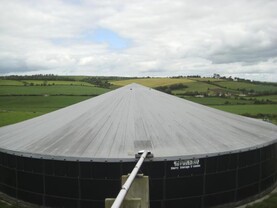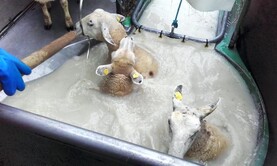The format of Tuesday night’s CAP town hall meeting, hosted by the Department of Agriculture, included the ability to ask questions in written format.
These questions and answers were not visible to other viewers, so it is impossible to gauge the most pertinent questions.
Below is a selection of the topical questions also being raised regularly by farmers and answered on the night by Department officials.
Q. Will trading of entitlements continue under the proposed new CAP?
A. “Whether you like trading of entitlements or don’t like trading of entitlements, as a farmer the agreement is clear – we must provide trading of entitlements for farmers going into the future, so absolutely there will be trading of entitlements in the future. It’s important for me to say to you at this point that the value of entitlements is going to change – there is little doubt about that in 2023. And just like you would have gotten notification from us at the start of this year, saying what value your entitlements were this year, we will be doing that as we move towards the new CAP as well.
“As we move and as the value of your entitlements change, you as a business person and looking after your own business, you need to know that that value will change. So if you’re stepping out on the lease of entitlements for several years, or whether you’re renting out or renting in or you’re selling or whatever you’re doing with your entitlements, you have to know that under the new CAP, they will change in value and you will be well advised to build allowance for that in to whatever contracts you are putting in place. As we get closer to that 85% minimum [convergence] mark, the variation in value of individual entitlements, that band will narrow quite a bit, so there won’t be the same variation in the unit value of entitlements that you might have seen historically.”
To what extent will partnerships be affected by convergence?
“In essence, convergence is blind to what type of farm structure holds those entitlements. Convergence will carry on, so whether you own the same 32 entitlements that you had in 2015, or whether you own 10 and you are renting in 50 each of those different sets of entitlements, they will all continue on their path that will be set out for them across the next CAP. So whether it’s a partnership, a limited company, an individual farmer – whatever it might be, convergence will still apply across those entitlements.”
Why are there no details around the budget for the proposed schemes?
“Yes that is the case, because those budgetary allocations have not been agreed, there is still some discussion going on between ourselves in the Department of Agriculture and the Department of Public Expenditure and Reform. As soon as we have agreement on those and a clear structure around those, we will be in a position to fill in those details. We hope to do that very soon. So at the moment, we have gone with the interventions without funding, particularly where they involve national co-financing.”
What upper age will be taken for young farmers?
“40 is still the age that is there and we don’t see that changing. It is possible to go younger but it is likely we think it will be 40.”
Why is there a minimum stocking density for an organic farming scheme?
“Under the current scheme, there is a minimum stocking rate of 32.5kg organic nitrogen per hectare per annum, as declared on the BPS application. This is an extensive stocking rate and is equivalent to half a suckler cow per hectare or a suckler cow per 2ha. Farmers not reaching that particular level will reach a pro rata payment to their level of production. The main reason for the minimum stocking rate requirement is to ensure that there is adequate grassland management and also to ensure a minimum level of organic production to satisfy organic supply chain requirements, thus meeting consumer demands. It has to be noted though, that most organic farmers in the current setup would meet the stocking rate requirements. These stocking rate requirements are being reviewed in the context of the proposed new scheme.”
How will priority access to the Agri-Environment Climate Measure (AECM) work for organic farming applicants?
“Currently, a registered organic farmer does qualify for priority access in the GLAS under the current RDP, by selecting actions that were appropriate to their farm. It is proposed that this again will be the case for the new AECM. It is envisaged that farmers who wish to avail of such priority access will be required to state when they are applying for the AECM that they are registered with one of the certification bodies and then when we confirm that registration, the farmer will be accepted in to the scheme, subject, of course, to satisfying the eligibility requirements.”
Why will farmers participating in the proposed Suckler Carbon Efficiency Programme be required to be a member of the Bord Bia sustainable beef and lamb assurance scheme?
“This is a carbon measurement scheme. Currently, that is done through the Bord Bia sustainability survey and that is a fundamental thing that underpins the scheme, so that’s important for that [suckler] scheme.”
Why is there a provision in the proposed Sheep Improvement Scheme (SIS) for farmers to participate in the Bord Bia sustainable beef and lamb assurance scheme (SBLAS)?
“The rationale for the inclusion of the eligibility requirement for SBLAS is that quality assured stock is a prerequisite for some European markets. It’s becoming an increasingly important market tool. Currently, we don’t produce enough quality assured (QA) stock in the sheep sector to provide consistent supply across the year, so it is in the interest of developing and maintaining markets. QA certification is going to be increasingly important in all livestock markets and particularly sheep.”






 This is a subscriber-only article
This is a subscriber-only article










SHARING OPTIONS: